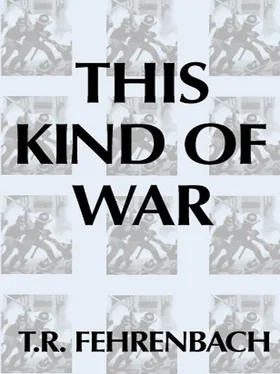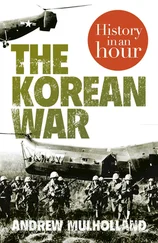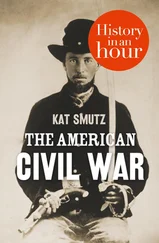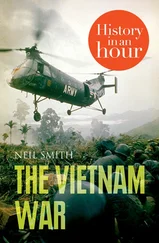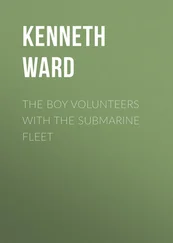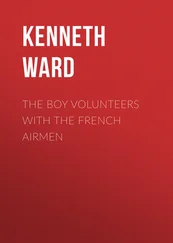The withdrawal immediately became ragged and chaotic. Nobody wanted to be last in a game where all advantage obviously lay with being first. The men got out of their holes, leaving their crew-served weapons. They left their machine guns, recoilless rifles, and mortars for the enemy.
Getting up from its holes to withdraw, Task Force Smith now came under heavy machine-gun fire from the flanks, and here it took its heavy losses. At close range, automatic weapons chewed the retreating Americans, breaking them up into small, disorganized units.
They left their dead where they lay, and abandoned the thirty or so wounded who were too hurt to walk. One medical sergeant, whose name has been lost, refused to leave the wounded. He was not heard from again.
With his last company leaving the hill, Colonel Smith struck off toward Perry's position, to tell the artillery that the infantry was pulling out. Finding Perry, Smith was amazed to find five guns operable and only one man other than Perry wounded. But it was too late now for the artillery to take a hand.
The artillerymen were quite ready to go. Quickly, they lifted sights and breech locks from their howitzers, and took them to their vehicles. Smith, the hobbling Perry, and many of the gunners then walked back to Osan, three miles away, where the artillery had left many of their trucks, which they found undamaged.
But Osan was occupied by enemy tanks. The little convoy struck out on a dirt road to the east, trying to reach Ansong. Soon they overran straggling groups of infantry struggling over the hills and sloshing through the rice paddies. Covered with slime, running, these men had tossed aside their steel helmets. Some had dropped their shoes, and many had lost shirts. None of them had weapons other than a few rifles, and two or three clips of ammunition per man.
They shouted at the trucks as they passed. The artillerymen stopped and picked up about one hundred men of this group. Then they continued eastward, away from the enemy.
The NKPA, apparently satisfied with taking the ridge, did not pursue. Besides, the Americans had left many good things behind to occupy the victors.
Early the next morning, 6 July, Colonel Smith could account for only 185 men. Later, the C Company commander came in with 65 more. The artillery was missing 5 officers and 26 men.
Survivors straggled into several Korean towns for a number of days. Some men walked all the way to the east coast; some reached the Yellow Sea on the west. One man finally came into Pusan by sampan.
Task Force Smith, designed to be an arrogant display of strength to bluff the enemy into halting his advance, had delayed the Inmun Gun exactly seven hours.
| Go to Table of Contents |
8
The Late Company A
Tragically … when the fighting was over the militiamen who had scampered remained to be war-battered heroes. Campaigners for public office told them how gallant they had been; expounded on the glories of New Orleans and the Thames and Lundy's Lane and ignored Hull's surrender, Wilkinson's fail ures, the scuttle at Blandensburg… the lessons and problems were forgot ten by people and government.
— James E. Edmonds, FIGHTING FOOLS, concerning the War of 1812.
AT THE TIME Task Force Smith saw its first tanks north of Osan, the 24th Division's 34th Regiment was in P'yongt'aek, a dirty little town of wattle huts and muddy streets fifteen miles south. Bit by bit and piece by piece, the 24th Division was arriving in Korea, coming into Pusan by LST or transport, then by rail northwestward to Taejon and points north.
And rapidly now, the burden of the war was falling on its back.
The heart of the ROK Army, with the loss of its best men north of the Han, had broken. It had little equipment remaining from the Seoul debacle, and the troops who had been in the south were poorly armed, with old Jap matèriel. The staff had fallen into controversy, with more than one high officer shouting "Communists!" at his colleagues. Fat Chae was gone. Lee Bum Suk, who had graduated from the United States Army Infantry School, became temporary chief of staff.
It was the Communist tanks, the ever-present, ever-leading T-34's, which could not be stopped and could not be destroyed, that wrecked every plan and every hope of the ROK commanders. Lee Bum Suk had sound notions for fighting tanks—but now he could no longer find any ROK soldiers with the heart to try them. The rash and the brave die early in a war.
Lee's successor, Chung II Kwon, dropped the whole problem in the Americans' laps. They were here now; their advisers had talked endlessly about the insignificance and vulnerability of Soviet tanks—now let the men from Mikuk , the Beautiful Land, fight the Communist tanks.
At the first the men from Mikuk were not worried. They were pretty well convinced that they were better than any gooks, North or South.
On 5 July, as the 1st and 3rd battalions of the understrength 34th Infantry closed in on P'yongt'aek, General Dean realized that he must make a strong defense of the P'yongt'aek-Ansong line. Here an arm of the Yellow Sea protected his left flank, and to the right there were mountains and poor roads. The main communications to the south came through P'yongt'aek and Ansong. South of them, the peninsula broadened out in all directions, particularly in the west, making defense much more complicated there than along this line.
Dean, who had flown in Korea 3 July, ordered 1st Battalion, 34th Infantry, north of P'yongt'aek to block the main road. The 3rd he sent to Ansong, a few miles to the east.
The young men of 1st Battalion resembled those of Task Force Smith. Already they had seen all of this stinking country they wanted to. They were ready to head back to their nice billets in Japan where their Japanese girl friends were probably already growing restless.
All of them were convinced they would be only a few days in Korea, at most. They had been told very little, for their officers themselves didn't know much. But as everyone said, "Just wait till the gooks see an American uniform—they'll turn around and run like hell!"
Coming north on the train from Taejon, 1st Battalion had picked up a new C.O., Lieutenant Colonel Ayres, who had had a fine record in Italy. Ayres confidently told his company commanders:
"There are supposed to be North Korean soldiers north of us. These men are poorly trained. Only about half of them have weapons, and we'll have no difficulty stopping them."
It was never disclosed who had briefed Colonel Ayres.
The company officers went back to their men and told them that this whole affair was only a police action and that, before long, everybody'd be back in good old Sasebo, Japan.
It is not certain that the young Americans knew what a police action was—but it is certain that none of them associated the term with combat.
The battalion marched north of P'yongt'aek in the same cold rain that soaked Task Force Smith. It halted in the green, grassy hills two miles north of town. Here both the highway and railbed ran through a cut with a low hill on each side, a good spot to defend. Colonel Ayres put B Company to the east of the road, and ordered C into reserve.
Captain Leroy Osburn's Able Company he placed on a hill to the left, with its line running down the hill through a rice paddy to the highway and railroad cuts.
A Company dug in. The reddish-brown earth was coarse, and turned easily, but in the pelting rain the foxholes began to fill with cold, dirty water. And because the front was wide for a weak company, the holes were far apart. The men of Lieutenant Driskell's 1st Platoon, down by the road, could not see the company CP up on the green hill.
The 2nd and 3rd platoons dug in along the hill; Weapons Platoon went in generally behind them. A Company's roster carried only 140 names, less than two-thirds its authorized wartime strength. For in America it was still peacetime, and had been for five years.
Читать дальше
